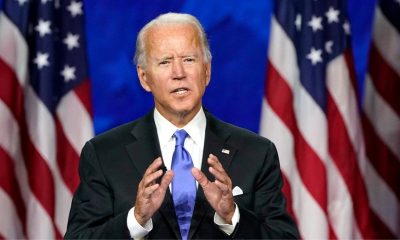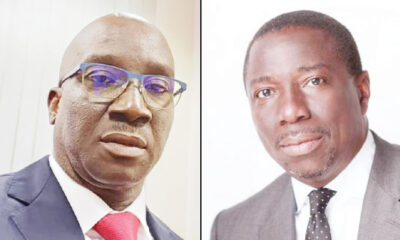News
Students Loan: Reps Propose 3% Increase To Meet Demand …Express Displeasure Over Slow Implementation

The House of Representatives Ad-hoc Committee on Students Loan Fund and Access to Higher Education, has said it is working to propose an increase of 3per cent as against initial 1per cent for students loan from revenue generated annually as recently announced by President Bola Tinubu.
The Chairman of the Ad-Hoc Committee, Hon Terseer Ugboh, made this known during a public hearing to ascertain the level of progress made so far by the presidential committee put together to remove all legal encumbrances hindering access to the loan by Nigerian students
He said lawmakers were ready to provide genuine intervention for the speedy take-off of the scheme.
Ugbor expressed displeasure with the slow implementation of the Students’ Loan programme which would have also cushioned the effects of fuel subsidy removal and asked the implementers to ensure there was fairness in distribution.
“We hope the system you are creating will be robust enough to take account of students who are already in school who want the loan to cover for the one year or two years of their schooling or students who are coming through direct entry.
“It seems to us from this perspective that 1per cent of the Federal Government Revenue as stated in the act would not be enough to cover students loans for a year given the hundreds of thousands of students that we have getting admission every year and those who are currently in school who may wish to also apply for a loan to cover for other years of their schooling.
“I want to suggest that if there is the need to increase the requirement of 1per cent to 3per cent. Then propose that and we are ever willing to look at it.It is something that is quite critical. This is the area that the Ministry of education can also hold on for it to be jerk up to at least 3per cent of this revenue.
“Now we are hearing the states or local governments may or may not permit that deduction so I think there may be Constitutional amendment before that 1% may be drawn. So if that is not done, the Federal Government can only draw from its own share of revenue which means state universities may be excluded if the State Governments do not agree to participate in funding this students loan from their allocation from the Federal Government.
“The issue of transparency is very key to a scheme like this. One of the reasons why many previous schemes (students loan) failed was the issue of transparency and commitment to executing these scheme. You want create a system that technologically enabled so that issue of godfatherism will be out.
“The National Assembly is the arm of government that does appropriation and you mentioned that with the current act as it is, you suggested that there could be a supplementary budget so that this scheme can start up. But we can’t propose supplementary budget if we don’t have an idea of what you think this students loans scheme will costs Nigeria,” he stated.
Director, Legal Services of the Central Bank of Nigeria (CBN), Kofo Alada, who spoke for Technical Committee said a supplementary budget was needed to make funds available for the take-off of the scheme, assuring that his team has set a target earlier than November.
He said: “We are technical people are working and the kind of process flow that we are looking at is something that Nigeria will be proud of.
“What I will requesting or recommending to this Committee is that of the funding requirement of this project, this body (parliament) has the power to convene and say we want to give supplementary budget for this particular project, it is within your power and for any body, it is better to plan so it is better for us to plan.
“Within what has been done by you, and the 9th National Assembly what we should do is that let’s look at how we can work. That’s why we are presenting this amendment to you. I am requesting the committee that rather than giving us still birth, be the vehicle that will give the lift for implementation.”
On his part, the Permanent Secretary, Federal Ministry of Education, David Adejoh, assured that the scheme would kick-off in the 2023/2024 academic session which may begin in October or December.
“The Assurances I give to you are based on what I see, first is that no academic session in Nigeria is starting before September. Remember because of the strike apart from private and some states universities, academic calendar has been moved back.
“So what we are saying now is, it might not be a 100% catchment but the loan is going to start in the 2023/2024 Academic Session, it can be October, it can be November depending on the school.
Between October and November we still stand a good chance.
“Once the technical committee finished and comes to the main committee then we will revert to the National Assembly with the clean bill. I know we can start this loan 2023/2024 Academic Session,” he stated.
News
NASS commends FIRS for surpassing 2024 target, sets 2025 goal

The National Assembly has lauded the Executive Chairman of the Federal Inland Revenue Service (FIRS), Mr Zacch Adedeji, for exceeding the 2024 revenue collection target of N19.4 trillion.
FIRS generated N21.6 trillion, surpassing the target by N2.2 trillion.
The commendation came during a meeting on Wednesday in Abuja, where the FIRS chairman appeared before the joint committee on Finance to defend the service’s revenue projections for 2025.
The committee proposed a N25 trillion revenue generation target for FIRS in the coming fiscal year.
Deputy Chairman of the House of Representatives Committee on Finance, Saidu Abdullahi, was the first to commend Adedeji’s performance, calling it “unprecedented” and “worthy of commendation.”
“The feat achieved by FIRS in revenue collection for 2024 was unprecedented and truly commendable.
“Surpassing the target set for the agency in the 2024 Appropriation Act, from N19.4 trillion to N21.6 trillion, is both encouraging and impressive,” he said.
He encouraged the FIRS to study the tax collection methods of South Africa, which generated higher tax revenue, and to focus on expanding the taxable base to include more informal sector workers.
Sen. Joel Onowakpo emphasised that tax collection was a global norm, and advised the committee to raise FIRS’s projected 2025 revenue target to N30 trillion.
Similarly, Sen. Binos Yeroe lauded Adedeji’s innovative approach in surpassing the 2024 target.
“Your performance in 2024 was highly commendable, and I hope you continue to maintain this level of success,” he said.
Rep. Etanabene Benedict suggested aiming for N60 trillion in 2025 to avoid borrowing.
Committee chairmen also supported the proposed N25 trillion revenue goal for 2025; with Sen. Sani Musa stating that it was both “achievable and surpassable.”
News
Abbas, Kalu express grief over Deputy Chief Whip, Onanuga’s death

Speaker of House of Representatives, Tajudeen Abbas, has expressed deep grief over the demise of the Deputy Chief Whip of the house, Rep. Adewunmi Onanuga.
In a statement on yesterday, Abbas described the late lawmaker as a strong pillar who would be sorely missed in the house.
The Tide source reports that Onanuga, who died on Wednesday, represented Ikenne/Sagamu/Remo North Federal Constituency and was serving her second term in the house.
Abbas said that he had led members of the house in support and prayers for Onanuga during her health challenge and was hopeful of her recovery, saying that her eventual death was painful.
He recalled Onanuga’s campaigns for gender equality, women empowerment and inclusion in politics and governance, as Chairman, House Committee on Women Affairs and Social Welfare in the Ninth House and as a principal officer in the 10th House.
Abbas also recalled how the late lawmaker, as the only female member in the leadership of the house, inspired and rallied female legislators for the greater good of the chamber and the country in general.
“Onanuga was a brilliant woman, experienced politician, resourceful lawmaker and a dependable ally in the legislative business,” he said.
Abbas commiserated with the Onanuga family and her constituents, the people and the government of Ogun as well as the All Progressives Congress (APC) on the demise of the legislator.
Also, the Deputy Speaker, House of Representatives, Rep. Benjamin Kalu, expressed sadness over Onanuga’s death.
Kalu described the deceased as a shining example of dedication, compassion and selfless lawmaker whose service to her constituents and the nation was outstanding.
He acknowledged her support for the Peace In South East Project (PISE-P), which demonstrated her passion for defeating insecurity in Nigeria.
“Onanuga was a dedicated and committed lawmaker, renowned for her unwavering commitment to peace.
“Her passion for promoting harmony and understanding was truly commendable. Beyond her legislative accomplishments, Onanuga’s compassion, humility and simplicity inspired countless individuals.
“Her warm and infectious smile, coupled with her empathetic nature, endeared her to everyone she met, making her a beloved figure in the lives of many,” he said.
Kalu said that Onanuga would be remembered for her commitment to the cause of women’s empowerment and political inclusion as well as her relentless efforts toward ensuring that the gender bills were passed.
The deputy speaker extended his heartfelt condolences to the Onanuga family, her colleagues and constituents, saying that she would be greatly missed.
He prayed for the peaceful repose of the soul of the late lawmaker and the fortitude to bear the loss.
News
Rotary Foundation commits $300m to polio eradication in Nigeria

The Rotary International Foundation says it has committed over 300 million dollars to polio eradication in Nigeria.
Its Chairman, Board of Trustees, Mark Maloney, disclosed this on Thursday while conducting polio immunisation at a Primary Healthcare Centre in Jahi, Abuja.
According to him, polio eradication is Rotary’s number one priority worldwide and it is focused on eradicating the variant type two poliovirus cases discovered in 2024.
Maloney said efforts towards eradicating the polio variant should be intensified, adding that recording success in that area would be beneficial to the Nigerian government.
He also commended the Federal Government’s polio accountability programme as well as all Rotarians for their efforts in putting an end to the disease.
“The Nigerian government is facing a significant challenge with the continuation of variant polio type two, and so far, we have seen about 92 cases through the cases that have been evaluated in 2024.
“We encourage the government to redouble their efforts to put the focus on this polio eradication as they did with the Wild Polio Virus (WPV), and they were successful.”
On new donations to Nigeria, Maloney said that Rotary would allocate some funds in 2025, but the amount was yet to be determined.
“There are 50 million dollars that I expect will be allocated, but a lot of it has to go to Pakistan and Afghanistan, where WPV is still endemic.
“Though, I think there will be a significant tranche of funds, maybe not tens of millions, but a significant amount of money will be allocated to Nigeria,” he added.
The chairman noted that the organisation has allocated two million dollars to its Programme of Scale project aimed at reducing the rate of birth-related mortality in Nigeria.
“What we are looking to do is to decrease the rate of mortality in births in this country, and it is operating now in several districts.
“One way that the mortality rate can be decreased is for more births to happen in a healthcare facility rather than at home.
“We have seen in the first year of the programme a significant increase in the percentages of births happening in medical facilities.
“One district had gone from 11 per cent happening in medical facilities to 33 per cent, which is a significant increase,” he added.
The Chairman of the organisation’s Nigeria National Polio Plus Committee, Mr Joshua Hassan, said outbreak immunisation efforts are conducted locally in response to the vaccine-derived variant of polio.
Hassan said national immunisation days are planned twice a year for the entire country.
According to him, the organisation is focusing more of its efforts on Kano, Zamfara, Katsina, Kebbi, and Sokoto states.
Prof. Emmanuel Lufadeju, the National Coordinator of Together for Healthy Families in Nigeria, said that the Programme of Scale project was designed to reduce maternal mortality among women by 25 per cent.
Lufadeju said that this is done through community dialogue, home outreaches, medical outreaches, and capacity building.
“We are going to train a lot of people, including doctors and nurses.
“Then we are going to do something that is called a social, behavioural change, to change the attitude of people and make them deliver in the facility instead of delivering at home.”
He added that the two million dollar project, which began in 2024, is expected to end in 2025.
The Tide source reports that Maloney is in Nigeria for an official visit to embark on advocacy, carry out symbolic immunisation, visit the Programme of Scale project areas, and also visit President Bola Tinubu.
-
Niger Delta5 days ago
Diri Gives Stewardship On Infrastructure Development
-
News5 days ago
Govs Back Tax Reform Bills, Reject VAT Increase
-

 Featured5 days ago
Featured5 days agoTinubu congratulates Nigerian scientists, engineers on making Biden’s honour list
-

 News5 days ago
News5 days agoNASS commends FIRS for surpassing 2024 target, sets 2025 goal
-
Business5 days ago
CBN Slams N1.34bn Fine On 9 Banks With Indespencable ATMs …Reiterates validity of old N1000, N500, N200 denominations
-
News5 days ago
Tinubu Congratulates Okonjo-Iweala, Two Others On UNILAG’s Honorary Doctorate Degrees
-
Rivers5 days ago
RSBOP moves to review the procurement processes for service delivery …Hints on departments merger
-

 Politics5 days ago
Politics5 days agoGunshots Disrupt Proceedings As Edo Gov’ship Tribunal Begins Hearing

